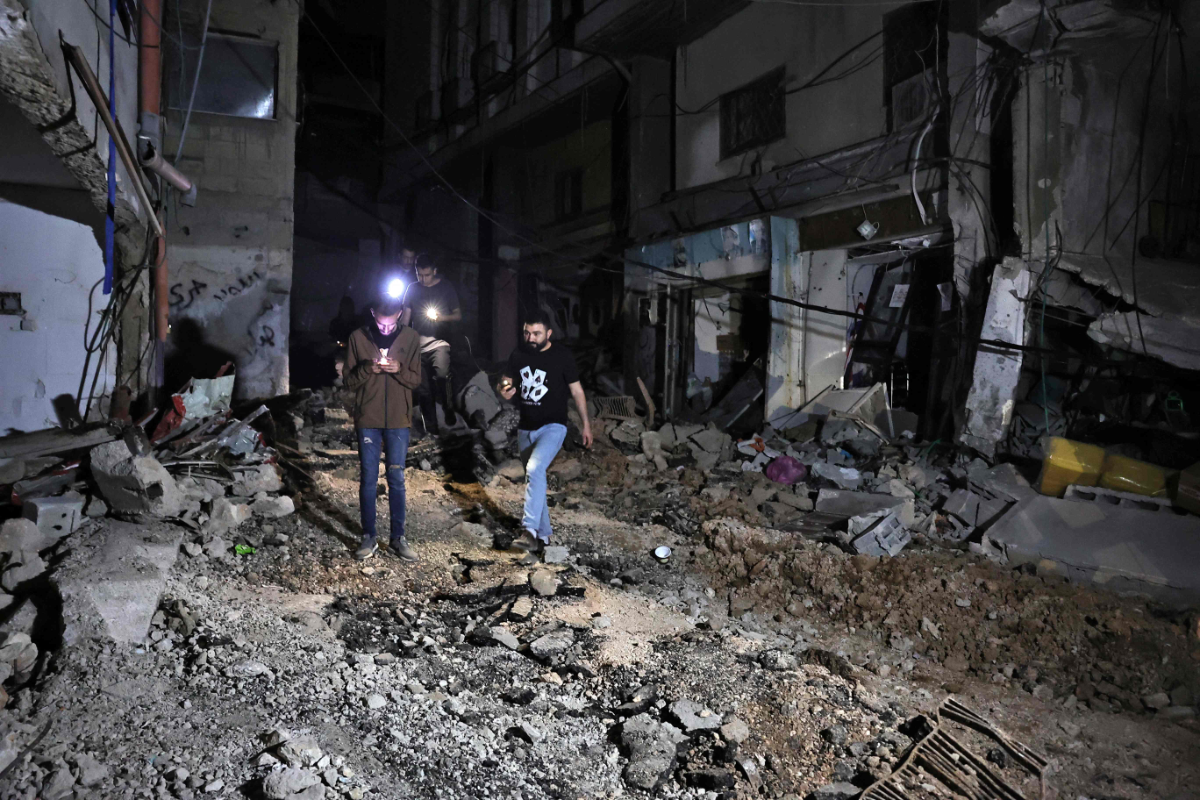JEDDDAH: An Israeli airstrike on a house in Gaza’s southernmost city of Rafah left at least nine people dead, six of them children, and the army killed 14 Palestinians in a raid on Nur Shams refugee camp in the north of the occupied West Bank.
The Gaza strike late on Friday hit Rafah’s western Tel Sultan neighborhood. At Al-Najjar Hospital, relatives sobbed and hugged children’s shrouded bodies. “Hamza my beloved. Your hair looks so pretty,” a mourning grandmother said.
The fatalities included Abdel-Fattah Sobhi Radwan, his wife Najlaa Ahmed Aweidah and their three children, his brother-in-law Ahmed Barhoum said. Barhoum lost his wife, Rawan Radwan, and their five-year-old daughter, Alaa.
“This is a world devoid of all human values and morals,” Barhoum said, crying as he cradled Alaa’s body. “The only martyrs were women and children.”
Also, an Israeli airstrike hit a house in the urban refugee camp of Bureji in central Gaza, killing at least one man and injuring two.
The war was sparked by an unprecedented Oct. 7 raid into southern Israel by Hamas and other militant groups that left about 1,200 people dead, the vast majority civilians, and saw about 250 kidnapped and taken into Gaza. Israel says about 130 hostages remain in Gaza, although more than 30 have died. Gaza’s Health Ministry said the death toll in the besieged strip has gone up to 34,049.
The Gaza Health Ministry said Saturday the bodies of 37 people killed by Israeli strikes were brought to hospitals in Gaza over the past 24 hours. Hospitals also received 68 wounded, it said.
The latest figures bring the overall Palestinian death toll from the Israel-Hamas war to at least 34,049, and the number of wounded to 76,901, the ministry said. Although the Hamas-run health authorities do not differentiate between combatants and civilians in their count, they say at least two thirds have been children and women.
The war has sent regional tensions spiraling, leading to a dramatic eruption of violence between Israel and its archenemy Iran that threatened to escalate into a full-blown war.
Meanwhile, Israeli forces killed 14 Palestinians during a raid in the occupied West Bank on Saturday, while an ambulance driver was killed as he went to pick up wounded from a separate attack by violent Jewish settlers, Palestinian authorities said.

Palestinians inspect the damage following an Israeli raid on the Nur Shams refugee camp in the occupied West bank on April 20, 2024. (AFP)
Israeli forces began an extended raid in the early hours of Friday in the Nur Shams area, near the flashpoint Palestinian city of Tulkarm and were still exchanging fire with armed fighters well into Saturday.
Israeli military vehicles massed and bursts of gunfire were heard, while at least three drones were seen hovering above Nur Shams, an area housing refugees and their descendants from the 1948 war that accompanied the creation of the state of Israel.
The Tulkarm Brigades, which groups forces from numerous Palestinian factions, said its fighters exchanged fire with Israeli forces on Saturday.
Journalists saw bodies in the street and houses hit by blasts as Israeli drones flew overhead and armored vehicles moved through the camp.
Since the Oct. 7 Hamas attack on southern Israel, more than 460 Palestinians have been killed by Israeli fire in the West Bank, Palestinian health officials say. Israel stages frequent raids into towns and cities in the volatile territory. The dead have included militants, but also stone-throwers and bystanders. Some have also been killed in attacks by Israeli settlers.
Separately, three Hezbollah fighters were killed in an Israeli strike on a house in southern Lebanon. Hezbollah officials said they will “respond proportionately to any Israeli violation of the established ceiling in the confrontation.”
The group’s deputy, Naim Qassem, said: “If any escalation reaches a certain level, we will confront it as required. There is no withdrawal from the confrontation, and no retreat from support for and protection of Gaza.”
Turkish President Recep Tayyip Erdogan discussed efforts to deliver aid to Gaza and reach a fair and lasting peace in the region during a meeting with Hamas leader Ismail Haniyeh in Istanbul.
For Wolfango Piccoli, co-president of Teneo Intelligence in London, the meeting is part of Erdogan’s attempts to reposition himself as a credible defender of the Palestinian cause after his recent electoral defeat.
Thousands of Palestinians have been arrested and hundreds killed during regular operations by Israeli army and police since the start of the Gaza war, most members of armed groups, but also stone-throwing youths and uninvolved civilians.
In a separate incident, the Palestinian health ministry said a 50-year-old ambulance driver was killed by Israeli gunfire near the village of Al-Sawiya, south of the city of Nablus, as he was making his way to transport people injured during the attack on the village.
It was not immediately clear whether he was shot by settlers. There was no immediate comment from the military.
(With Agencies)





























